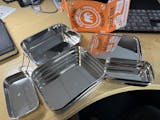A perfect size to take lunch in. Air and water-tight. I plucked up courage to put it in the microwave! Worked a treat. Then no leaks in my bag afterwards. Also fits and stacks with other similar boxes in the freezer so very versatile.
Beautiful quality - thrilled with the bowl
A great set of containers that are so popular it took a while before I managed to buy them as they keep going out of stock!
This is the kind of thing that never needs replacing, unless you leave it behind in your holiday accommodation 🤦🏼♂️
It’s a really lovely lunch box. Very robust and built to last
































